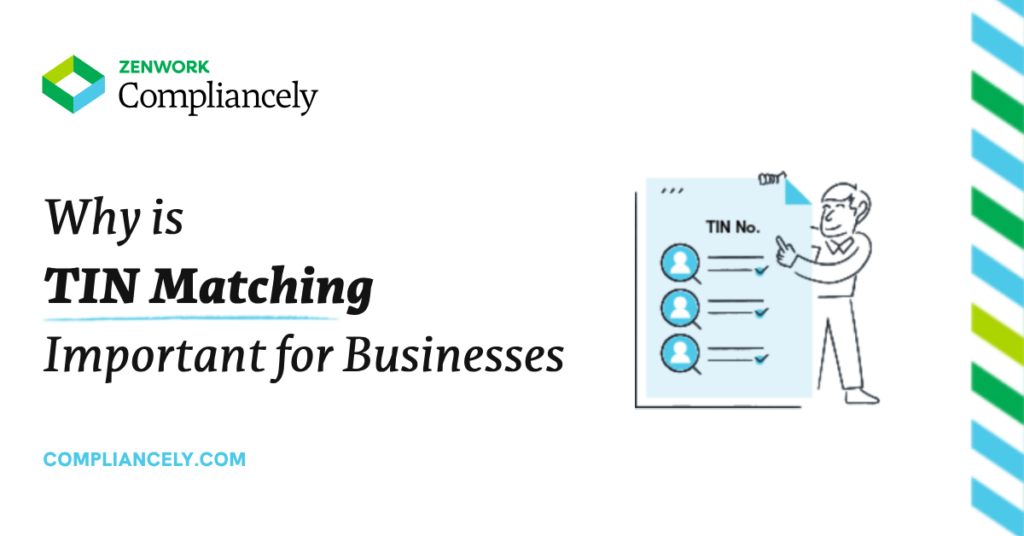Why is TIN Matching Important for Businesses?

Taxpayer Identification Numbers (TINs) are essential in the U.S. tax system, serving as unique identifiers for taxpayers. Understanding not just the purpose and types of TINs but also the practicalities of how they are solicited is crucial for businesses to ensure compliance with IRS regulations.
Therefore, verifying Taxpayer Identification Numbers (TINs) is important for businesses in different industries. TIN matching typically occurs at two points when paying a vendor or customer: when onboarding a new vendor or customer based on information collected on Form W9 and prior to reporting amounts paid on 1099s to ensure name/TIN information is still accurate. Make sure the correct TIN is entered to help maintain compliance in financial reporting.
What is TIN Matching?
A Taxpayer Identification Number (TIN) is a unique nine-digit identifier allocated by the IRS (Internal Revenue Service) or Social Security Administration to individuals and businesses for tax purposes. It is used on Federal income tax payments and other IRS forms to identify individuals or business entities.
Types of Taxpayer Identification Number:
- Social Security Number (SSN)
- Employer Identification Number (EIN)
- Individual Taxpayer Identification Number (ITIN)
- Taxpayer Identification Number for Pending U.S. Adoptions (ATIN)
- Preparer Taxpayer Identification Number (PTIN)
TIN matching involves cross-referencing the TINs provided by payees with IRS records, there by confirming their authenticity. Businesses should handle this process carefully to avoid errors and ensure compliance with tax regulations.
Why is IRS TIN Matching important?
The significance of TIN matching cannot be overstated. Accurate TIN verification prevents IRS penalties, avoids B notices, and ensures correct tax reporting. By utilizing the IRS TIN Matching API, you proactively manage your tax information, safeguard against compliance issues, and maintain the integrity of your financial data.
Here’s why TIN matching is so crucial and how it can be effectively managed:
Avoid B-notices: To ensure accurate tax reporting and avoid potential IRS penalties, including B-notices and backup withholdings, it is crucial to validate taxpayer identification numbers (TINs) beforehand by leveraging the IRS TIN Matching API.
Error Reduction: Confirm TINs and names accurately to reduce errors in your tax filings. The IRS TIN Matching API is vital in mitigating discrepancies, thereby minimizing compliance concerns and financial penalties. This advanced verification can save up to $260 per incorrect or late return, emphasizing the importance of correct TIN and name combinations before submission.
Onboard Gig Workers Confidently: With the increasing number of gig workers, ensuring the accuracy of their tax information is paramount. Utilizing the IRS TIN Matching API ensures that you onboard individuals confidently, having verified their TINs against IRS records.
Fraud Prevention: Use the IRS TIN Matching API to stay ahead of regulatory requirements and prevent fraudulent activities. By consistently adhering to IRS guidelines, our service helps reduce the risk of audits and ensures that you provide accurate tax reporting.
Avoid Backup Withholding: Incorrect TINs can lead to mandatory backup withholding, where you may be required to withhold taxes from payments to vendors or contractors. Verifying TINs in advance through the IRS TIN Matching API helps you avoid this scenario.
Efficiently integrating the TIN Matching API into your processes supports a proactive approach to handling tax-related responsibilities, helping to mitigate future IRS penalties and streamline the onboarding of gig workers. To ensure accurate tax reporting and avoid potential IRS penalties, including B-notices and backup withholding, it’s crucial to validate taxpayer identification numbers (TINs) beforehand. By leveraging the IRS TIN Matching API.
Importance of TIN Matching Across Different Business Types
Financial Institutions:
Challenges: Compliance with IRS regulations and risk of inaccurate tax reporting affecting clients.
Solution: Automated TIN verification ensures accurate and timely compliance, improving reporting accuracy and minimizing the risk of penalties.
Freelancer or Gig economy Platforms:
Challenges: Verifying diverse TIN types and formats for independent contractors.
Solution: Compliancely’s versatile validation supports various TIN types, simplifying the management of freelancer TINs and ensuring accurate verification.
Healthcare Providers:
Challenges: Managing TINs for employees and patients while avoiding fraud and maintaining compliance with IRS reporting requirements.
Solution: The secure handling and compliance assurance features of TIN matching tools help maintain IRS compliance and safeguard sensitive information.
E-commerce Platforms:
Challenges: Verifying TINs for vendors and sellers, ensuring accurate tax reporting for marketplace transactions.
Solution: Efficient verification tools quickly validate TINs, reducing errors and ensuring compliance with tax laws.
Real Estate Agencies:
Challenges: Managing TINs for property transactions and ensuring accurate Form 1099 submissions.
Solution: Accurate data validation ensures correct Form 1099 reporting, with integration features to streamline the verification process.
Legal and Consulting Firms:
Challenges: Verifying TINs for clients and contractors to ensure compliance with tax regulations.
Solution: Reliable TIN verification ensures compliance and safeguards against regulatory issues.
Final Thoughts
IRS TIN matching is a significant process for the smooth running of businesses. It helps to maintain accurate tax reporting, maintain compliance, and avoid potential penalties. By using advanced tools and APIs like Compliancely’s TIN Matching API, businesses can optimize TIN verification, reduce errors, and streamline their workflow.
Accurate TIN matching not only helps meet regulatory requirements but also protects businesses from financial and reputational risks.

